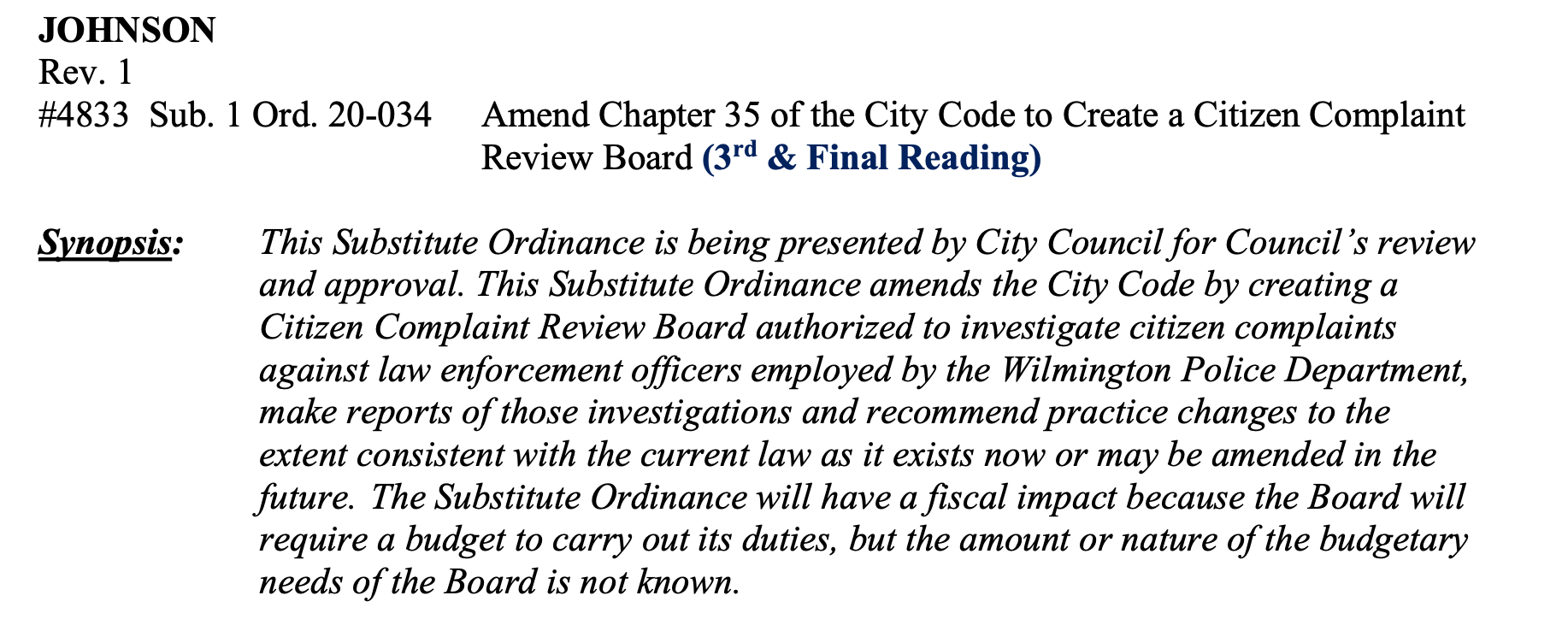Mayor Purzycki Allows Citizen Complaint Review Board Ordinance to Become Law Without His Signature
November 25, 2020
Suggests Changes to Correct Legislation Shortcomings
Wilmington Mayor Mike Purzycki sent a statement to City Council earlier this afternoon explaining why he is allowing a Council-sponsored Ordinance that would create a Citizen Complaint Review Board to become law without his signature. The Mayor is now sharing the same statement with the people of Wilmington to explain why important changes are needed to the legislation.
The following is Mayor Purzycki’s statement:
“On November 19, 2020, Wilmington City Council adopted Substitute No. 1 to Ordinance 20-034 (“An Ordinance to Amend Chapter 2 of the City Code to Create a Citizen Complaint Review Board”). By Charter, and as a regular practice of this Administration, an ordinance amending the Code can be signed into law, or vetoed, by the Mayor. The other City Charter option open to a Mayor is to do neither and allow the unsigned ordinance to become law after the passage of 10 days, which in this case is November 29, 2020. I have decided to take the latter course, and the following explains my reasoning.

VIRTUAL REGULAR MEETING OF WILMINGTON CITY COUNCIL NOVEMBER 19, 2020 @ 6:30 P.M.Legislative Business agenda item
For the last four years, the eyes of this Administration have been fixed upon its North Star—the goal of a Just City that fosters equal opportunity and provides fair treatment for the people of Wilmington, especially at the hands of the government serving them. In this regard, the trust of the people in its police force functioning as the core instrument of public safety is essential—and irreplaceable once lost.

Mayor Michael Purzycki and his wife Bette Richitelli celebrates after Mayor Purzycki defeated his opponents VELDA JONES-POTTER and JUSTEN WRIGHT on Primary Tuesday; September 15, 2020, in Wilmington Delaware. Photo By Saquan Stimpson
This Administration supports the value of citizen oversight of the police.
Unfortunately, this ordinance does not provide effective oversight. Rather, it supplies only the illusion of it. It promises meaningful change that it cannot deliver while mandating an additional bureaucracy, the full cost of which is unknown. On its first day with its first case, this Board will run full speed into an insurmountable wall of state laws and labor agreements which will stymie its efforts. Those preemptive laws, with which this ordinance must comply, will render the Board’s investigations ineffective and incomplete because the Board will not have access to law-enforcement witnesses or confidential materials. As currently constructed, the Board will become a frustrating exercise for all concerned. This law promises much, but, as currently written and in a current legal environment that neutralizes its authority and restricts its scope, it is doomed to produce little to expectant and hopeful City residents. While the Board is intended to make a positive difference, its efficacy depends upon uncertain, dramatic, and controversial legislative action by the General Assembly in Dover. In the meantime, the City and its residents will foot the bill—whatever that might be.
Citizen oversight has the potential to improve the relationship, understanding, and cooperation between a community and its police force if it is done well with clear and understood goals as well as a planned path forward to be accomplished with the cooperation and input of all stakeholders. A failed effort, on the other hand, threatens to promote distrust and possibly cause irreparable damage to relationship building.
Also of great concern is the Board’s composition. Seats on the Board dedicated to specific advocacy organizations and officeholders make it more vulnerable to political influence and biases. Its investigations and meetings are more easily directed to achieve aims and goals having nothing to do with the Board’s mission and focus. The Board should be composed of persons qualified by their experience, education, and training to guide oversight and investigations and render thoughtful judgment. The members should be simply appointed by the Mayor and confirmed by Council.
Based on the broad public appeal of the principle of civilian oversight, but in view of the strong reservations addressed in this message, I have decided to allow this ordinance to become law without my signature. It is my hope and respectful request to my colleagues in the upcoming session of Council that, as the Board is brought into existence over the next year, there be further discussion and vigorous debate committed to improving this legislation so that it has the opportunity to deliver upon the promises made to the people of this City.”

